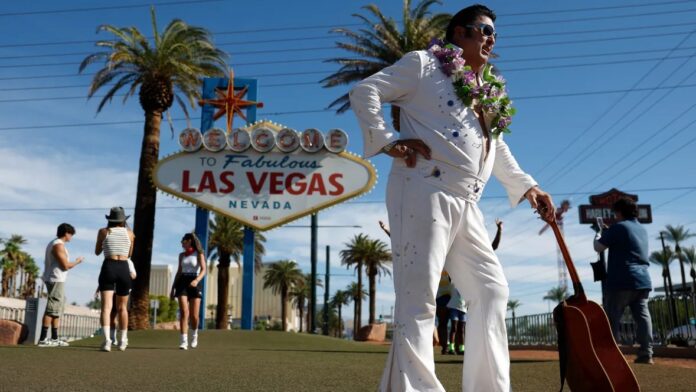Las Vegas Faces a Tourist Slump Amid Canadian Boycott
After booming in the post-COVID era, Las Vegas now finds itself in an unexpected slump as tourist numbers plunge, particularly from Canada. The financial repercussions of strained Canada-U.S. relations, primarily due to trade disputes under the previous Trump administration, have left Sin City scrambling to attract visitors.
A Sharp Decline in Numbers
Data from the Las Vegas Convention and Visitors Authority reveals that the total number of visitors has decreased by over 11% year-over-year, marking one of the most significant declines outside of the pandemic. Significant among these statistics are the airline figures, pointing to a staggering decrease in Canadian tourists flooding into the gambling mecca.
In June, the number of Air Canada passengers fell by 33% compared to the same month last year, while fellow carrier WestJet experienced a nearly identical 31% drop. The low-cost airline Flair faced an even steeper decline of 62%. Such statistics paint a worrying picture for the city’s tourism-dependent economy.
Changing Dynamics of Visitor Demographics
Although the Canadian boycott has dominated the discussion, it’s essential to note that some U.S. travelers are also refraining from visiting Las Vegas. Concerns over increased resort fees and diminished gambling perks are contributing to this trend. Yet, resort operators are quick to underscore the impact of Canadian visitors on their revenue streams.
MGM Resorts’ President and CEO, Bill Hornbuckle, noted during a recent investor conference that the decline in Canadian visitors has been significant and persistent. This downturn began earlier this year, coinciding with the onset of a trade war that affected sentiments toward U.S. destinations significantly.
Economic Ramifications
The ramifications are tangible, affecting not just the casinos but the broader economy of Nevada as well. As of June, unemployment in Las Vegas rose to 5.8%, representing one of the highest rates among major U.S. metropolitan areas.
Caesars Entertainment’s CEO, Thomas Reeg, echoed Hornbuckle’s sentiments, attributing part of the company’s disappointing second-quarter performance to the fall in Canadian visitors, a demographic that usually constitutes a substantial portion of their clientele.
Local Sentiments
Many Canadians have expressed their discontent with their government’s treatment by the Trump administration, leading to a palpable sense of resistance. Winnipeg resident Martyn Daly, for instance, shared that he and his wife usually visit Las Vegas annually, but they are choosing to boycott the city for the time being.
"We’re pretty upset with what’s going on in the U.S.," he said, explaining that this was a personal stand against perceived disrespect. For him, the decision not to spend their vacation funds in the U.S. is a way to voice their frustrations.
Likewise, Regina’s Guy Kerbrat canceled a long-planned trip to see AC/DC in protest. “We looked at each other and said, ‘We can’t support Trump and these policies that are so anti-Canadian,’” he remarked. This notion of taking a principled stand resonates with many Canadians who view their travel patterns as a form of silent protest.
Local Responses and Economic Strategy
Local politicians and economists are acutely aware of the economic impact of the downturn in tourism. Canadian visitors contributed a staggering $3.6 billion to the Las Vegas economy last year, supporting approximately 43,000 jobs. This figure is particularly significant considering it approaches the economic output of Nellis Air Force Base, a crucial military installation in the area.
Senator Catherine Cortez Masto has been vocal about the detrimental effects of the tourism decline, deeming the situation an urgent matter that warrants attention from local leadership. Efforts are underway to restore good relations and refresh tourism campaigns aimed at attracting Canadians back to Las Vegas.
Promotional Strategies on the Horizon
Given the heavy reliance on Canadian tourism, the prospect of creative promotional strategies is being discussed to entice former visitors back. With hotel prices already dropping in an effort to lure Canadians, it’s a crucial time for Las Vegas to reassess its approach to marketing and guest experiences.
Statements from locals indicate that Canadians are already receiving attractive offers aimed at rekindling their interest. However, many are steadfast in their resolve, believing in the power of collective economic impact to signal their discontent.
A Cultural and Economic Crossroads
The ongoing situation reflects a broader narrative of interconnectedness between nations and underscores how political dynamics can ripple through the tourism and hospitality industry. As the cultural and economic fabric of Las Vegas hangs in the balance, the city must navigate these turbulent waters and rethink its approach to welcoming back the Canadian market.
This slump serves as a reminder of the delicate relationship between politics and tourism, illustrating how national sentiments can sharply influence travel trends. For many, Las Vegas remains a cherished destination, but the road to recovery will hinge on repairing not only the economy but also the strained international relationship.
As the city works to recover, it faces an uphill battle, striving to regain its standing as the ultimate entertainment capital of the world.
